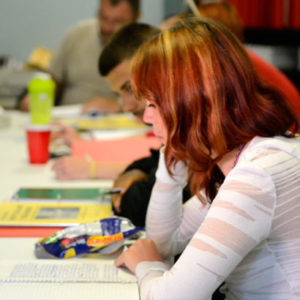 Each Monday through Friday, clients are given the opportunity to take part in recovery-based group therapy sessions. These different sessions are referred to as “tracks.” Each track has a different treatment modality, but each one stresses the importance of the client being ready to change.
Each Monday through Friday, clients are given the opportunity to take part in recovery-based group therapy sessions. These different sessions are referred to as “tracks.” Each track has a different treatment modality, but each one stresses the importance of the client being ready to change.
- AA Self-Help
- Awareness
- CBT (Cognitive Behavioral Therapy)
- Celebrate Recovery
- Faith-Based
- NA Self-Help
- SMART Recovery
Our clients are encouraged to try more than one different recovery group track. Clients are welcome to try all of the groups if they chose to do so. After working through different groups, clients will be encouraged to select one particular track that they’ll attend on a regular basis.
Group Therapy Tracks
Awareness Therapy
The Awareness group therapy track may be the appropriate choice for clients who don’t feel comfortable in either the 12-step self-help recovery programs or the Christianity-based tracks. This track is for those who feel comfortable with concepts and ideas from Buddhism and other Eastern philosophies. Clients who choose this track will be encouraged to take part in lectures, meditation, spiritual and self-help disciplines, and enhanced cognitive therapies.
Celebrate Recovery
The Celebrate Recovery track is a spirituality-based group therapy program with Christ as its center. In this group, clients who are open to a Christian perspective can gather together, worship, and help each other learn how to help themselves guided by a Christian worldview. The Celebrate Recovery track can be used in combination with the Faith-Based group therapy track.
Cognitive Behavioral Therapy
CBT, or Cognitive Behavioral Therapy, is a concept for self-empowerment that allows clients to use facts, not emotions, to aid in their recovery and self-help. These techniques encourage clients to learn to make sound, rational decisions. Clients in this track are encouraged to participate in lectures and watch educational programs that teach individuals the ABC technique of recovery. The CBT group therapy track can be used in conjunction with the SMART Recovery group therapy track.
Faith-Based Therapy
This track is designed for clients who’ll be receptive to group therapy approaches grounded in a Christian perspective. In this track, clients use Bible studies, concepts, sermons, and lectures on spirituality that are taught and led by ordained Christian ministers and pastors. The faith-based track can be used in combination with the Celebrate Recovery group track if the client chooses.
Self-Help Group Therapy (AA or NA)
AA stands for Alcoholics Anonymous; NA stands for Narcotics Anonymous. These self-help support groups are for clients who feel comfortable in therapy groups where they will have the opportunity to listen to lectures about recovery and addiction topics and will also be encouraged to participate in group self-help meetings.
SMART Recovery
For those individuals who don’t feel comfortable in either the 12-step self-help recovery programs or the faith-based tracks (either the Eastern philosophy track or the Christianity-based tracks), the SMART Recovery therapy track is a possibility. Members who participate in this track are not expected to identify as religious or spiritual. This group, which can be used in combination with the Cognitive Behavior Therapy Track, focuses on self-empowerment.
SMART stands for Self-Management and Recovery Training. This science-based group therapy track uses a four-point program to help those who have an addiction and abuse issues learn to help themselves recover. Concepts used in this track are related to Cognitive Behavior Therapy (CBT) and Rational-Emotive Behavior Therapy (REBT). REBT is a therapeutic method that helps individuals learn how to “un-upset” themselves during times of emotional upset and stress so that they can teach themselves healthy, positive ways to deal with everyday problems.
Through these concepts and through additional tools and behavioral techniques, participants can learn to manage their own behavior. With these behavior management techniques, individuals in recovery from addiction can help maintain their own sobriety choices.

